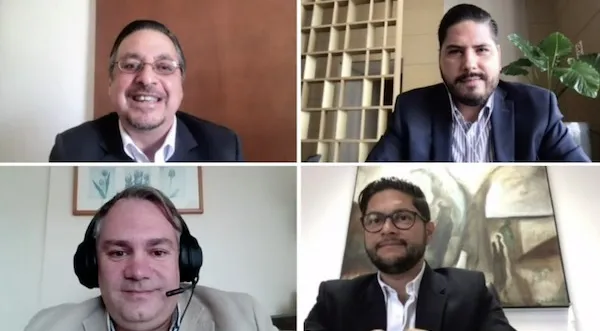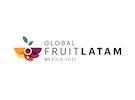The Global Fruit Latam conference wraps up today, March 26th, and multiple more educational sessions and discussions are planned for the day. Yesterday, one of the discussion panels looked at the challenges and opportunities for Latin America in the international market. The panel was led in discussion by Hugo Castellano, agricultural journalist and communication advisor. Castellano led Hiram Ibarra, President of the Latin American Organization of Young Agribusiness, Francisco Seva, agricultural journalist and Executive Director of the Mexican newspaper “La Voz del Campo”, and Carlos Salinas Osornio, Director of Business Ties and Intelligence at the Ministry of Agriculture and Rural Development Mexico, in a discussion on this topic.

Top: Hugo Castellano and Carlos Salinas Osornio. Bottom: Francisco Seva and Hiram Ibarra.
Diversification of markets
One of the biggest opportunities for the Latin American market, which is currently still a challenge to overcome, is that of diversifying the market. “For Mexico specifically, the US is the traditional destination for most produce products,” Ibarra says. “About 80% of Mexico’s products such as mangos and avocados go to the US,” Seva adds. The US is the traditional market because of logistical access as well as the relationship that the two countries have, but the panelists urge both Mexican and other Latin American producers to look beyond the US and work on diversifying their markets.
“There are a few markets that I see a lot of potential with,” says Seva. “Specifically, Russia is very interesting because they have a huge purchasing power and European countries can’t export to there because of geopolitical factors. Asia is also a very important market to focus on – countries like Japan and Korea are very interested in the premium products that we are able to offer from Latin America, and this year a new phytosanitary rule should be finalized; this rule will allow Mexico to export their mangoes to China,” he explains.
One of the most important steps to take when looking to diversity markets is to seek collaboration and partnerships, says Osornio. “We have to realize that we aren’t superheroes, and we can’t do everything by ourselves. We have to join efforts to be able to reach our goals. Improving the agriculture sector is truly in everyone’s best interest, because everybody needs to eat. If you emphasize that, you should be able to make strategic alliances wherever you look,” he says.
The importance of branding and promotion Another element that Seva urges companies to focus on to help them overcome challenges and increase their opportunities is to increase their investments into building and promoting a brand. “This has been something that has been growing in Europe in recent years, but in Latin America it is still really lacking. Spending money on promotions is an investment into your future profitability. The Canary Islands have done this very successfully for their bananas, they have built a powerful brand that has increased their profitability. Latin America has a very powerful agricultural sector, and we need to work on telling our story to the customers and the end consumers.”
Another element that Seva urges companies to focus on to help them overcome challenges and increase their opportunities is to increase their investments into building and promoting a brand. “This has been something that has been growing in Europe in recent years, but in Latin America it is still really lacking. Spending money on promotions is an investment into your future profitability. The Canary Islands have done this very successfully for their bananas, they have built a powerful brand that has increased their profitability. Latin America has a very powerful agricultural sector, and we need to work on telling our story to the customers and the end consumers.”
Osornio, whose focus is on the Mexican state of Jalisco, adds “We need to create our own brand – that will help us go beyond our current limitations. Here in Jalisco, we are working on creating a new narrative: the fields represent quality of life. We are building links to this narrative all around us, and this will help us further unleash all our capabilities and skills.”
Seva concludes: “To sell a product, you need to believe in it. Latin America needs to work on believing in their own quality and project that out into the markets through a strong brand. Investing in promotions is investing in profitability – not just locally, but internationally. You can have extraordinary quality, but you need to also communicate that. You have to believe in your own abilities before you can manifest that success commercially.”
Today is the last day of the Global Fruit Latam conference. To sign up to participate in today’s sessions and networking events, click here.
